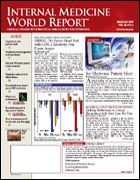Publication
Article
Folic Acid: A Surprise Treatment for Age-Related Hearing Loss?
Author(s):
Unexpected Link to Dietary Deficiency Uncovered
Ann Intern Med
Long considered to be unmanageable with medical or surgical treatment, age-related hearing loss is one of the most common chronic diseases in the elderly. A new study has now found that 3 years of folic acid supplementation in older adults who had not been using a folate-fortified diet slowed the aged-related decline in the hearing of speech frequencies (. 2007;146:1-9).
This study included 728 men and women (aged 50-70 years) from the Netherlands with plasma total homocysteine concentrations ≥13 μmol/L and vitamin B12 concentrations 200 pmol/L. Patients with middle ear dysfunction, unilateral hearing loss, or pathologic ear conditions unrelated to aging were excluded. The participants were randomized to daily oral supplements containing 800 μg folic acid or placebo.
Hearing thresholds were calculated as average pure-tone air conduction thresholds of both ears at low (0.5, 1, and 2 kHz) and high (4, 6, and 8 kHz) frequencies.
P
At study onset, median hearing thresholds were 11.7 dB for low frequencies and 34.2 dB for high frequencies. After 3 years of supplementation, low-frequency thresholds increased by 1.0 dB in those receiving folic acid and by 1.7 dB in those receiving placebo ( = .020). Supplementation had no effect on the decline in high-frequency thresholds.
It is important to keep in mind that this study was conducted in the Netherlands at a time when folic acid fortification in food was not mandated, and that baseline folate levels were approximately half of those found in countries such as the United States, where food fortification with this vitamin is a requirement, the investigators note.
“Our data suggest that participants with low baseline folate status showed a stronger treatment effect. Consequently, the effect of folic acid on hearing thresholds may be weaker in people with better folate status,” lead investigator Jane Durga, PhD, and colleagues write.
In an accompanying editorial (pages 63-64), Robert A. Dobie, MD, echoed this statement, noting, “People with better nutritional status, perhaps including almost all US seniors, may not benefit.”
Dr Dobie concluded that these results, if confirmed, may show that audiometric screening during middle age to choose candidates for treatment may prove beneficial, especially in areas where folate deficiency is widespread. The findings may also “convince nations that do not now require it” to begin mandating dietary folate supplementation.






